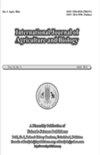脯氨酸叶面施用通过调节生长和营养动态提高玉米耐盐性
Q2 Agricultural and Biological Sciences
引用次数: 1
摘要
通过2019年和2020年夏季的田间试验,研究了叶面施用脯氨酸作为渗透保护剂对钙质盐碱地玉米产量和品质响应的影响。玉米叶面施用脯氨酸分别为100、200、300和400 mg/L,对照不喷施(仅浇水)。这些处理在一个季节中应用三次,间隔一个月。结果表明,在生理盐水条件下,叶面施脯氨酸可提高玉米的生长、生化指标、养分含量、产量和含油量。在叶面施用400 mg/L脯氨酸时,各项指标均最高,而在叶面施用300 mg/L时差异不显著。叶面施用400 mg/L脯氨酸时产量、组分和含油率最高。叶面施用400 mg/L脯氨酸,籽粒产量和含油量分别比对照提高157.2和79%。叶面施用400 mg/L脯氨酸对小麦生长、生化指标和养分含量的促进作用最大,最终导致籽粒产量和出油率的提高。©2022朋友科学出版社本文章由计算机程序翻译,如有差异,请以英文原文为准。
Foliar Application of Proline Improves Salinity Tolerance in Maize by Modulating Growth and Nutrient Dynamics
A field experiment was carried out during 2019 and 2020 summer seasons to evaluate the effect of foliar applied proline as osmoprotectant on yield and quality response of maize in calcareous saline soils. Proline was applied to maize as foliar application 100, 200, 300 and 400 mg/L including no spray as control (with only water). These treatments were applied three times in a season with one month interval. The results showed that foliar application of proline increased growth, biochemical parameters, nutrient content, yield and its component including oil percent in maize under saline condition. Foliar application of proline at 400 mg/L gave the highest values of most studied parameters, but there was no significant differences were found for foliar applied 300 mg/L. Yield and its components and oil percent recorded the highest values with treatments 400 mg/L proline foliar application. The foliar applied proline (400 mg/L) showed relative increase in grain yield and oil percent of 157.2 and 79% respectively compared with control. Foliar applied proline at 400 mg/L produced the highest increase in growth, biochemical parameters, and nutrient contents which finally resulted in improved grain yield and oil percent. © 2022 Friends Science Publishers
求助全文
通过发布文献求助,成功后即可免费获取论文全文。
去求助
来源期刊

International Journal of Agriculture and Biology
AGRICULTURE, MULTIDISCIPLINARY-
CiteScore
1.70
自引率
0.00%
发文量
40
审稿时长
5 months
期刊介绍:
Information not localized
 求助内容:
求助内容: 应助结果提醒方式:
应助结果提醒方式:


